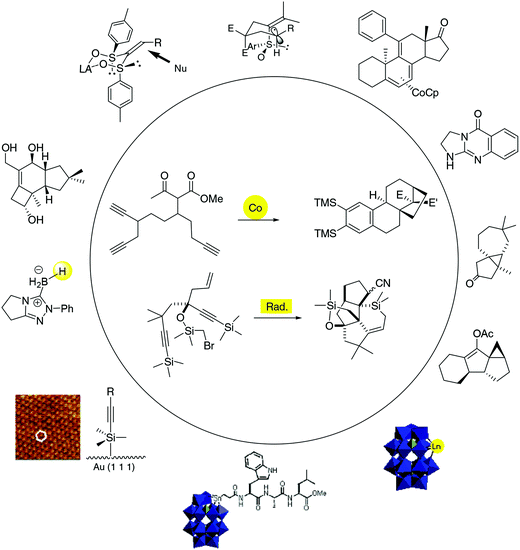Editorial: Max Malacria 65th birthday special issue
Louis
Fensterbank
and
Corinne
Aubert
Université Pierre et Marie Curie Paris 6, 4 Place Jussieu, 75252 Paris cedex 5, France. E-mail: louis.fensterbank@upmc.fr
Max Malacria hails from Marseille, with strong Corsican bonds thanks to his wife Gisèle. After his undergraduate studies in Marseille, he obtained a Doctorat d'Etat from the Université Aix-Marseille III in 1974, under the supervision of Professor Marcel Bertrand. His fecund work was dedicated to the application of allenes in organic synthesis and notably the very valuable oxidative cycloisomerization of vinylallenes and allylallenes into valuable cyclopentanones and bicyclo[3.1.0]cyclohexanones. In the same year, he started his academic career as Assistant at the Université de Lyon I in the laboratory of Professor Jacques Goré, focusing on the development of electrophilic catalysis of the oxy-Cope reaction, in collaboration with Rhône-Poulenc. Attracted by the Californian way of life and the science of Professor K. Peter C. Vollhardt, he spent almost two years at Berkeley as a NATO and Fullbright fellow, working on the development of the blooming area of cobalt-catalyzed [2 + 2 + 2] cycloadditions. In 1983, he returned to the Université de Lyon I as Maître de Conférences, starting his independent career, and was then rapidly promoted to Professeur at the Université Pierre et Marie Curie (UPMC) in 1985.
In 1991, he was elected junior member of the Institut Universitaire de France, and was promoted to senior member in 2001.
At UPMC, he started a very ambitious research program devoted at first to organometallic catalysis (cobalt and palladium) and radical chemistry, which rapidly spread to other areas such as asymmetric synthesis and hybrid materials. All his research started from a simple question: is it possible to find a synthetic pathway for any relevant molecule? Thus, it is the invention of new versatile synthetic methods which has guided his endless research appetite. Importantly, the proposed processes have generally been devised according to efficiency and sustainability requirements. Max has been recognized for his elegant cascades, allowing the transformation of readily available starting materials into complex molecular scaffolds.
Let us quote a few landmarks of Max’s research:
- radical cascades leading to natural products or analogs
- asymmetric radical processes
- asymmetric synthesis based on the use of heteroatoms (bissulfoxides)
- organometallic catalysis with cobalt, gold and platinum
- polycyclization cascades with cobalt
- new hybrid materials (polyoxometallates)
Max has also been the organizer and co-organizer of several unforgettable conferences notably in Corsica (GECO 31 & 32, ISOFR 9, 2nd French–German Meeting in Organic Chemistry).
Max is the author of 300 publications, book chapters and patents. He has been the supervisor of 70 PhD students. He has been a visiting professor in Switzerland, Italy, Spain, Belgium, Japan, Israel, Taipei, China and Australia. His works granted him several awards and prizes, e.g. the Prize of the Division of Organic Chemistry from the Société Française de Chimie (1997), the Grammaticakis–Newman prize from the Académie française des sciences (2000), the silver medal of the CNRS (2001), the French–Spanish Catalan–Sabatier prize from the Real Sociedad Española de Química (2009), the Wm. G. Dauben Award from the University of California Berkeley and the Grand Prix Achille le Bel from the Société Chimique de France (2014). He also received a Doctor Honoris Causa from the University of Ottawa (2014).
We all know Max as a charismatic and passionate scientist, admired for his outstanding expertise in organic chemistry. He has been an extraordinary mentor for more than a hundred research associates, from undergraduate students to permanent staff, always striving for excellence. From a human point of view, all have been touched by his clear, independent and sometimes loud, but always respectful, way of thinking. Last but not least, Max is a great wine expert.
We wish him a happy birthday and all the best for the coming years.
| This journal is © the Partner Organisations 2014 |

